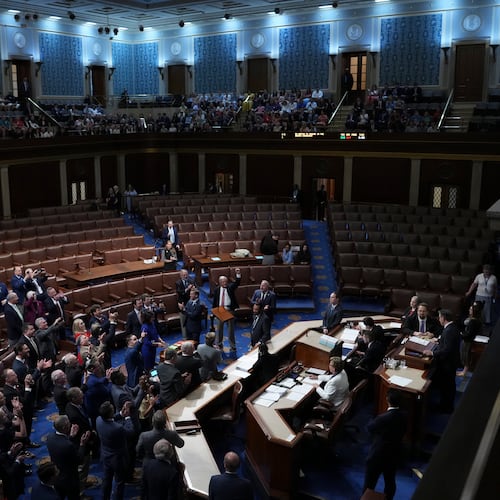We get a contested congressional election, and look what happens.
People get excited, even passionate. Voters begin to believe again that politics can matter, that they themselves matter, that they can play a meaningful role in their own governance. Something approaching democracy breaks out, contentious and splendid and a little unruly. The system has life once more.
At least for a passing moment.
Look at a map. Look at history. The boundaries of Georgia’s 6th Congressional District were drawn to ensure that only Republicans could compete and win there. Only a set of extraordinary circumstances — the election of Donald Trump and his ongoing lack of popularity, a vacancy created by the appointment of U.S. Rep. Tom Price to Trump’s Cabinet, the absence of an obvious Republican replacement — could create even a semblance of drama in the race. As I write this, I don’t know whether Democrat Jon Ossoff has pulled off the miracle, but I do know that a miracle it would be.
The same is true throughout the state, in districts both Republican and Democratic. In five of Georgia’s 14 congressional districts, the partisan imbalance is so overwhelming that last fall, nobody of the opposing party even filed to run. Voters in those five districts literally had no choice in who was going to represent them in Congress.
In the remaining nine districts, including the 6th, the concept of choice was illusory at best. None of the nine “contested” races was decided by fewer than 20 points. In a state that Trump won by just 5 percentage points, the average margin of victory in “contested” congressional races was 35.5 points. That’s ridiculous.
In the state Legislature, the situation is even worse. In the 180-member Georgia House, 149 candidates faced no general-election competition last fall from the supposedly “opposing” party. Think about that: We like to tell ourselves that we live in a representative democracy, a republic, yet the truth is that almost 83 percent of Georgians did not get to choose who would represent them in Atlanta. It was chosen for them.
And yes, money also plays a critical role both in outcomes and growing public cynicism. Republicans are right: The 6th has been a contest only because of angry Democrats around the country who were looking for an outlet for that anger and who found it in an unknown candidate in far-off Georgia, running in a deeply Republican district. “Only $1 in every $20 raised for Democrat Jon Ossoff came from people inside GA-6,” as a tweet last week from the Republican National Committee in Washington pointed out.
However, the RNC did not happen to mention that it and other Washington Republicans have also been fully engaged in the 6th, investing millions of dollars in attack ads against Ossoff. How much of that money was raised from people within the district? Shoot, how much came from people of any kind, anywhere? We don’t know the answer. If you, as a citizen, want to give $200 to a candidate, your contribution must be publicly reported. If you’re a billionaire or a corporation wanting to invest $2 million in a particular political cause, the system gives you multiple ways to do so with complete anonymity.
So yes, given all that, what has happened in the 6th District is indeed bordering on the extraordinary. You can take that as a sign of a healthy republic but in fact it’s the opposite. It shouldn’t take the extraordinary to give people a voice, an actual choice. It shouldn’t require a once-in-a-lifetime confluence of unusual events and personalities to render democracy viable again in this one district, in this one election cycle.
But it has.
About the Author
Keep Reading
The Latest
Featured


